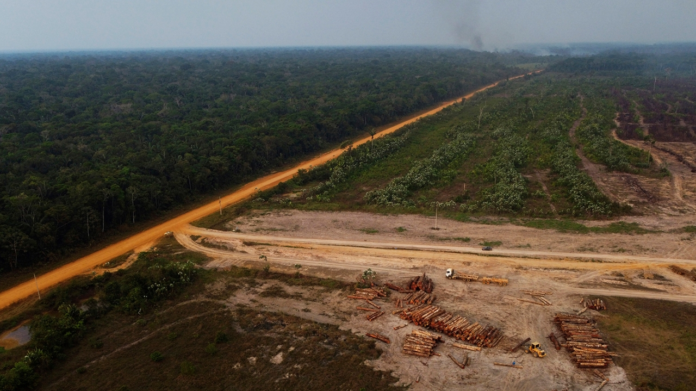Luiz Inácio “Lula” da Silva’s victory in Brazil’s presidential election has provided new hope for the world’s rainforests. Lula has pledged to fight for zero-deforestation in the Amazon and supported a global alliance with other tropical forests nations to advance climate goals. His victory opens the door for new U.S. and Brazil cooperation to solve two of today’s most pressing international problems — food insecurity and the climate crisis.
Stopping Amazon deforestation would help the 345 million people are at risk of starvation and the billions that are affected by extreme heat and climate change. Why? Let’s start with rain. The Amazon supports much of the global food system by regulating global rainfall patterns.
Amazon rainforest deforestation has been a major cause of climate pollution. Deforestation and forest degradation in the Amazon and elsewhere accounts for 11 percent of global greenhouse gas emissions. The Amazon, moreover, stores several times more carbon in its plants and soils than the world emits in a year.
Deforestation within the Amazon has been breaking records — increasing year after year. Experts have been sounding the alarm that without swift action the entire ecosystem might collapse, converting the Amazon to a dry savannah, and releasing massive amounts of climate pollution into the atmosphere. Deforestation has already cleared 17 percent of the Amazon and experts predict that if 20-25 percent of the total rainforest is lost, conversion may be irreversible.
Unfortunately, the rate of deforestation in Brazil has rapidly increased in 2022. If deforestation continues to increase at current rates, the Amazon may reach a point of no return within the next decade. This would end the Amazon rainforest’s role in distributing rainfall across Brazilian and U.S. agricultural lands and produce a climate catastrophe.
Scientific models show continued Amazon deforestation will significantly decrease rainfall vital to U.S. agricultural production. In the western U.S. a 10 to 20 percent decrease in rainfall is possible. Scientists also predict that significant Amazon deforestation can lead to a 25 percent decrease in rainfall for Texas with further decreases expected across the Midwest. Current droughts are already costing farmers and ranchers tens of billions of dollars and additional rainfall decreases means further food crises.
Brazilian agriculture production is already being harmed by deforestation reducing corn yields by five to ten percent. Experts project that continued deforestation will cost Brazil’s agricultural sector up to a billion dollars annually due to less rainfall.
Together the United States and Brazil provided 66 percent of the world’s soy, 42 percent of its corn, 30 percent of its poultry and 36 percent of global beef supplies. A decrease in production across one or both countries would make today’s food crises look small in comparison.
The world needs the Amazon rainforest for farmers and global food systems to survive. Deforestation under President-elect Lula’s presidential terms saw a 72 percent decrease in deforestation. Lula is pledging action on deforestation in the Amazon, but he will face strong opposition in the Brazilian Congress, which oversaw massive increases in deforestation under Lula’s predecessor.
Brazil will need the support of the international community to show how the Brazilian economy can grow without deforestation. Here are three actions the United States can take to support the Lula administration.
First, the United States should increase financial support for Brazil to pursue sustainable economic development without deforestation. Congress should pass the bipartisan AMAZON21 Act to create a $4.5 billion trust fund that would provide financial support to countries like Brazil when they reduce deforestation. In addition, President Biden should encourage G-7 members to jointly commit 25 percent of future international climate finance to protect the Amazon and other tropical forests.
Second, the U.S. must ensure that U.S. companies and consumers are not inadvertently fueling deforestation. Congress can achieve this by enacting the bipartisan FOREST Act, which would require that companies prove that they aren’t importing agricultural commodities, such as soy and beef, produced on illegally deforested land.
Finally, President Biden should work with President-elect Lula to ensure Brazil’s bid to join the Organization for Economic Co-operation and Development (OECD) creates a lasting framework for protecting the Amazon. OECD members have laid out a roadmap for Brazil to join that requires strengthening environmental and human rights safeguards. The Biden administration can start now to identify and support policies that will provide long-term security for the people and forests of the Amazon.
The loss of the Amazon rainforest would devastate the agricultural production of both Brazil and the United States, putting us all at risk. There is no time to wait in preventing the next global crisis before it begins.
Nigel Purvis is CEO of Climate Advisers and former Deputy Assistant Secretary of State for Oceans, Environment, and Science. Natalie Unterstell is President of the Brazilian Talanoa Institute and member of the Green Climate Fund Accreditation Panel.



